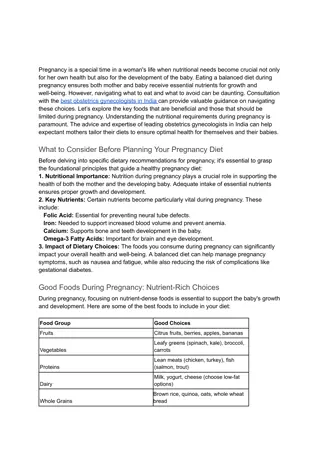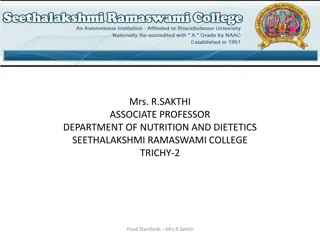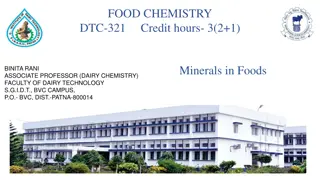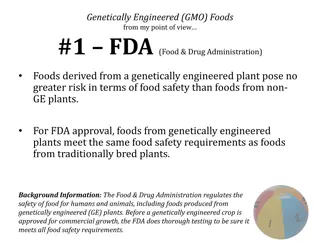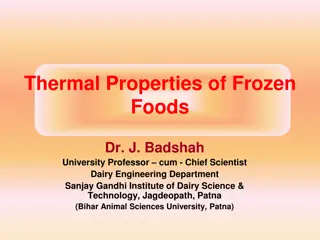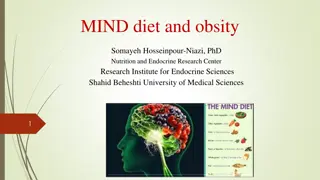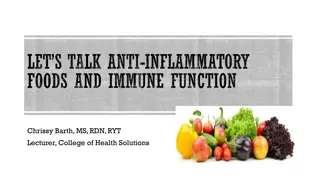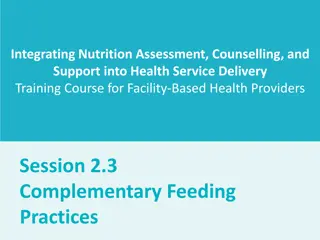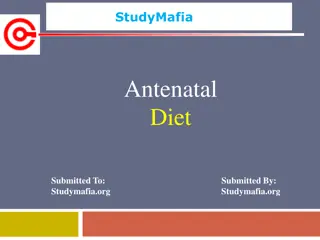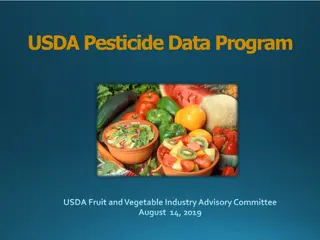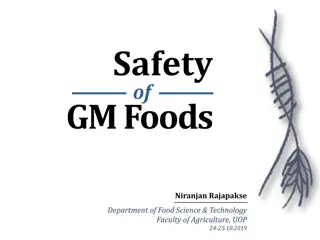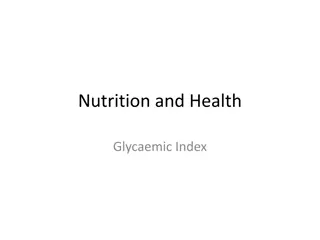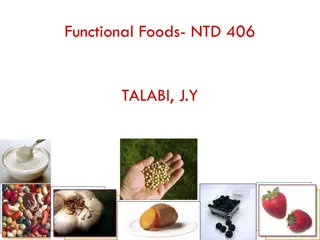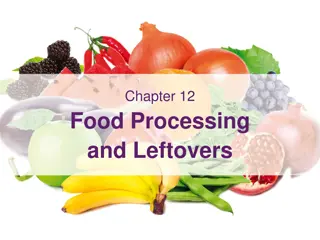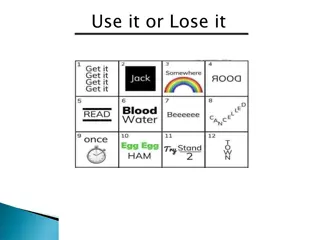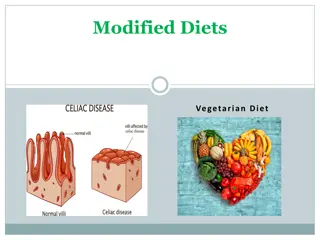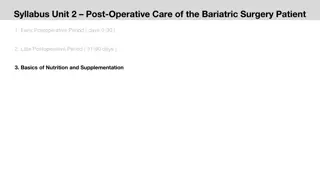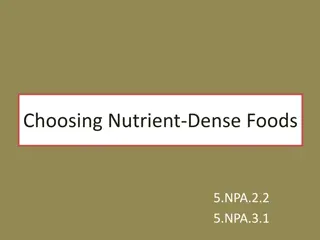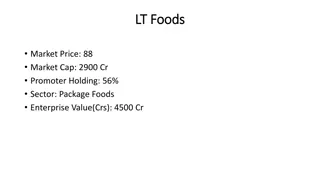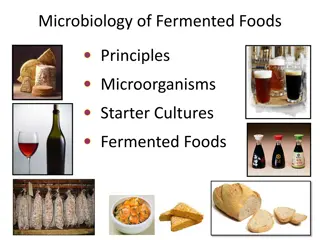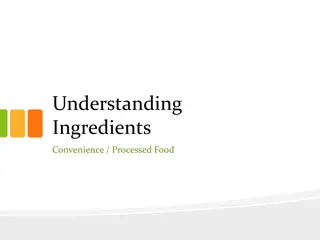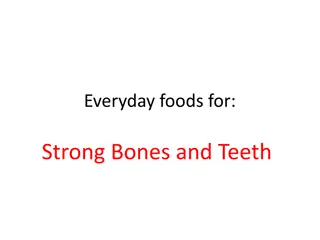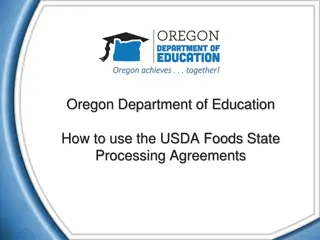Notification of Ministry of Public Health on Novel Food Regulations
This notification outlines the Ministry of Public Health's regulations on novel foods, including definitions, requirements, and examples. It also discusses food categories such as food supplements and special purpose foods, highlighting the importance of health-conscious consumer trends and the pote
2 views • 23 slides
Effective USDA Foods Procurement and Forecasting Strategies
Managing USDA Foods procurement involves analyzing historical data, estimating future trends, and streamlining menu planning to save time and reduce costs. Standardized recipes and inventory management are crucial for efficient operations. Understanding the location and value of USDA Foods, along wi
8 views • 11 slides
heart- health pdf
A healthy diet is crucial for overall well-being. Dr. Sunny Singhal emphasizes incorporating a variety of nutrient-dense foods, including fruits, vegetables, lean proteins, and whole grains. Avoid processed foods, maintain portion control, and stay hydrated to support physical health and mental clar
7 views • 1 slides
Eating Well During Pregnancy: Good Foods and Foods to Avoid
The advice and expertise of leading obstetrics gynecologists in India can help expectant mothers tailor their diets to ensure optimal health for themselves and their babies.
1 views • 3 slides
Understanding Food Standards and Quality Assurance in Nutrition and Dietetics
Explore the realm of food standards, quality assurance, and safety protocols in the field of nutrition and dietetics. Learn about the regulations set by international bodies like the Codex Alimentarius Commission, as well as the specific standards for various food products such as milk, spices, star
2 views • 33 slides
Understanding Trans Fat and Saturated Fat in Nutrition
Trans fats are unsaturated fats that can have negative health effects, found in baked goods, fried foods, and more. Saturated fats, mostly found in animal products, may increase the risk of heart disease. Learn how trans fats affect health and which foods contain them.
0 views • 11 slides
Understanding the Importance of Minerals in Foods
Minerals play vital roles in food chemistry and human nutrition. There are main elements, trace elements, and ultra-trace elements present in foods that contribute to various physiological functions. Sodium, potassium, magnesium, and calcium are essential minerals with specific roles impacting human
6 views • 27 slides
Understanding Genetically Engineered Foods: Perspectives and Insights
FDA ensures the safety of genetically engineered (GMO) foods, EPA reviews their environmental impact, farmers benefit from improved crop management, some consumers prefer non-GMO products, and nutritionally, GM foods are similar to non-GM. While scientific consensus supports the safety of GMOs, glob
1 views • 6 slides
Promoting Sustainable Local Foods for Nutrition Security in Nigeria
Food and nutrition insecurity in Nigeria is a pressing issue, prompting efforts to identify and promote locally available, nutritious foods. Stakeholder consultations in Sokoto, Kebbi, and Bauchi States highlighted the importance of staple crops like rice and millet, as well as bio-fortified crops.
0 views • 7 slides
Thermal Properties of Frozen Foods: Importance and Modeling Equations
Understanding the thermal properties of frozen foods is crucial for ensuring food safety and quality. Dr. J. Badshah discusses the significance of freezing, reduction of microorganism activity, and the role of thermal properties like density, specific heat, and thermal conductivity. Freezing point d
0 views • 15 slides
Nutrition Standards for School Food Sales
Proposed rules outline nutrition standards for all foods sold in schools to improve children's diets and health. The background emphasizes the importance of school nutrition programs, while the Healthy, Hunger-Free Kids Act grants authority to establish these standards. The proposal development cons
0 views • 31 slides
Understanding Dynamic Measurement of Viscoelastic Foods
Viscoelastic foods exhibit time-dependent properties that can be measured using oscillatory mode in viscometers like cone and plate or parallel plate viscometer. The shear stress under oscillating mode provides insights into the material's viscosity and elasticity. Characteristics such as Wissenberg
0 views • 7 slides
Understanding Convenience Foods: Processing, Benefits, and Drawbacks
Convenience foods are processed products designed to save time and effort in meal preparation, ranging from frozen and canned goods to ready-to-eat meals. While they offer advantages such as convenience and variety, they also have disadvantages like additives and higher costs. This text explores the
0 views • 15 slides
Understanding the Importance of a Balanced Diet for Good Health
A balanced diet is essential for providing the body with the necessary nutrients for proper functioning. It involves consuming a variety of foods to ensure the right balance of carbohydrates, proteins, fats, vitamins, and minerals. Malnutrition, whether due to under or over-nutrition, can have detri
0 views • 7 slides
The MIND Diet for Managing Obesity
Explore the MIND diet, a nutrition plan to support weight management by emphasizing brain-healthy foods. Learn about recommended foods like leafy greens, berries, nuts, olive oil, whole grains, fish, beans, and poultry, along with foods to avoid. This diet promotes cognitive health while addressing
0 views • 13 slides
Understanding Anti-Inflammatory Foods and Immune Function
Our health is closely linked to the gut microbiome, with fiber playing a key role in feeding beneficial gut bacteria. Incorporating anti-inflammatory polyphenols from plant-based sources like fruits, vegetables, and herbs can promote a healthier gut. Additionally, fermented foods act as natural prob
1 views • 8 slides
Integrating Nutrition Assessment and Counselling: Complementary Feeding Practices
This training course focuses on educating facility-based health providers on complementary feeding practices, emphasizing the importance of introducing solid foods along with breastfeeding at 6 months. The session covers topics like nutrition gaps in breast milk, optimal feeding principles, and util
0 views • 48 slides
Antenatal Diet Recommendations for a Healthy Pregnancy
Learn about the essential dietary recommendations for a healthy antenatal phase, including caloric needs, fluid intake, beneficial foods to include, and foods to avoid. Follow these guidelines to support a well-balanced diet during pregnancy and ensure the optimal health of both mother and baby.
0 views • 18 slides
Guidance for Complementary Feeding in Infants
After 6 months of age, breastfed infants may struggle to meet their nutrient needs from milk alone, necessitating the introduction of complementary foods. Implementing guiding principles can help ensure optimal nutrition and growth, including exclusive breastfeeding for the first 6 months, practicin
0 views • 18 slides
Understanding Healthy Nutrition Choices
Healthy foods include a variety of nutrient-rich options such as fruits, vegetables, whole grains, lean proteins, and low-fat dairy products. Carbohydrate foods can be found in sources like fruits, whole grains, and legumes. Protein-rich foods include meat, fish, poultry, dairy, and plant-based prot
0 views • 14 slides
USDA Pesticide Data Program Overview
The USDA Pesticide Data Program (PDP) provides high-quality pesticide residue data for US foods to support regulatory decision-making and ensure food safety. Through cooperative agreements with participating states, the program conducts sampling of various commodities, including fresh fruits and veg
0 views • 17 slides
Understanding the Safety and Regulation of GMO Foods
Explore the importance of genetically modified organisms (GMOs) in healthcare, agriculture, and food industry, along with the safety concerns, regulatory assessments, and international standards associated with GMO foods. Learn about the benefits, potential risks, and management strategies for ensur
1 views • 21 slides
Understanding Glycaemic Index in Nutrition and Health
Glycaemic Index (GI) measures how carbohydrate-containing foods affect blood glucose levels. High GI foods raise blood glucose rapidly, while low GI foods release glucose gradually. Studies track impacts on blood glucose levels, insulin secretion, fat storage, and pancreatic function. High GI foods
0 views • 15 slides
Exploring Functional Foods for Health Benefits
Functional foods are dietary components consumed primarily for health reasons, providing benefits beyond basic nutrition. Types of functional foods include beans, berries, cruciferous vegetables, and cocoa products. Beans contain saponins that may help protect against cancers and lower cholesterol l
0 views • 24 slides
Food Processing and Leftovers: Understanding Preservation Techniques
Food processing plays a crucial role in preserving and extending the shelf life of foods. This chapter explores the advantages and disadvantages of food processing, the conditions microorganisms need to grow, various methods of food preservation, guidelines for freezing food, the significance of bla
0 views • 33 slides
Effective Communication Strategies on GM Foods in Australia
Sasha Tait from FSANZ addresses the challenges faced in communicating with Australian consumers on GM foods due to values-based opposition. The country's transparency initiatives include public consultations and responses, increasing awareness. Social media presence allows direct communication. Usin
0 views • 10 slides
Equity in Development Partners Support on Health Financing in Lao PDR P4H Meeting
The meeting focuses on addressing health indicators, inequities, and health financing challenges in Lao PDR. It analyzes the background of health indicators, inequities by socio-economic status and ethnic groups, and the current health financing situation in the country. The discussion delves into s
1 views • 23 slides
Indiana 4-H Foods Project 2015 Overview
Indiana 4-H Foods Project 2015 aims to promote healthy food choices and habits among youth. The project includes fun activities like basic food prep, trying different foods, and conducting experiments. Various activity guides are structured based on grade levels and cover topics such as healthy food
0 views • 14 slides
Understanding the Importance of Calcium for Bone Health
Adequate calcium consumption is crucial for maintaining healthy bones, teeth, and overall body function. Failure to achieve peak bone mass in adulthood could lead to conditions like osteoporosis. Calcium-rich foods like dairy products, dark green leafy vegetables, and fortified foods play a vital ro
0 views • 18 slides
Understanding Oxalates: Sources, Health Impacts, and Foods to Watch Out For
Oxalates are naturally occurring substances found in various foods and the human metabolism, with potential implications for kidney stone formation and calcium absorption. Foods high in oxalates include rhubarb, chocolate, berries, nuts, grains, and leafy greens like spinach. Managing oxalate intake
0 views • 9 slides
Understanding Coeliac Disease and Modified Diets for a Healthier Lifestyle
Coeliac disease is an autoimmune condition that affects the body's ability to process gluten, leading to various symptoms like abdominal pain, fatigue, and nutrient deficiencies. Following a modified diet, such as a vegetarian or gluten-free diet, can help manage these symptoms and promote better he
0 views • 17 slides
Long-Term Dietary Management for Bariatric Surgery Patients
In the post-operative care of bariatric surgery patients, long-term dietary management plays a crucial role in ensuring successful weight loss maintenance. Factors such as motivation, willingness, and adherence to a healthy diet influence eating habits. Patients are advised on dietary progression, s
0 views • 10 slides
Making Informed Choices for Healthier Eating Habits
Learn about nutrient-dense foods, empty calories, sugar content in foods, effects of high-fat and sugar consumption on health, and the nutritional value of milk and yogurt. Understand how these choices can impact weight, cholesterol levels, blood pressure, and overall health.
0 views • 12 slides
Overview of LT Foods: Market Performance, Business Operations, and Future Potential
LT Foods, a prominent player in the packaged rice processing and export industry, boasts a strong brand portfolio including Daawat. With a focus on branded sales growth, reduction of debt, and product diversification, LT Foods is strategically positioning itself for future success. Recent developmen
0 views • 11 slides
Exploring the Fascinating World of Fermented Foods and Microorganisms
Unveil the intricate world of fermented foods, delving into the principles, microorganisms, and starter cultures involved. Discover the fine balance between spoilage and fermentation, the general properties and benefits of fermented foods, and the evolution of the fermented foods industry across tim
0 views • 16 slides
Integrating Administrative Data in Health Studies: A Case Study
This case study explores the integration of administrative data in health studies focusing on profiling the health status of Irish regions in 2010. The objectives include linking regional health profiles to prescribing patterns, incorporating demographics and drug scheme coverage rates, and simulati
1 views • 17 slides
Exploring Types of Convenience and Processed Foods
Convenience and processed foods offer time-saving benefits, ease of storage, and convenience for meal preparation. They come in various forms such as canned/bottled, frozen, and dried foods, each with specific advantages and preparation methods. Understanding these types of foods can help in making
0 views • 17 slides
Everyday Foods for Strong Bones and Teeth
Discover the key everyday foods that promote strong bones and teeth. From calcium-rich options like cheese, milk, and yogurt to creamy indulgences such as cheese spread and cream cheese, this guide will help you make informed choices for your dental and bone health.
0 views • 6 slides
The Importance of a Balanced Diet for Optimal Health
To maintain good health, it's essential to consume a variety of nutritious foods as depicted in the Eatwell Guide. Different food groups provide vital nutrients, with an emphasis on carbohydrates, fruits, vegetables, dairy, proteins, and fats. Checking labels on packaged foods is crucial. Explore di
1 views • 17 slides
Understanding USDA Foods State Processing Agreements in Oregon
The Oregon Department of Education works with state distributing agencies and school districts to leverage USDA Foods and convert them into convenient end products through processing agreements. Various levels of government can make regulations regarding nonprofit food service accounts, ensuring com
0 views • 13 slides



